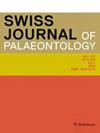Digital skull anatomy of the Oligocene North American tortoise Stylemys nebrascensis with taxonomic comments on the species and comparisons with extant testudinids of the Gopherus–Manouria clade
IF 2.2
2区 地球科学
Q1 PALEONTOLOGY
引用次数: 0
Abstract
The anatomy of North American tortoises is poorly understood, despite a rich fossil record from the Eocene and younger strata. Stylemys nebrascensis is a particularly noteworthy turtle in this regard, as hundreds of specimens are known from Oligocene deposits, and as this species is one of the earliest fossil turtles to have been described in the scientific literature. Since its initial description based on a shell, many specimens with more complete material have been referred to Stylemys nebrascensis. Here, we review and confirm the referral of an important historic specimen to Stylemys nebrascensis, which includes shell, non-shell postcranial, and skull material. This allows us to document unique skull features of Stylemys nebrascensis (e.g., an unusual ‘poststapedial canal’ that connects the posterior skull surface with the cavum acustico-jugulare) and to refer another well-preserved skull to the species. Based on computed-tomography scanning of these two skulls, we provide a detailed description of the cranial and mandibular osteology of Stylemys nebrascensis. Stylemys nebrascensis has a combination of plesiomorphic skull characteristics (e.g., retention of a medial jugal process) and derived traits shared with extant gopher tortoises (e.g., median premaxillary ridge) that suggest it may be a stem-representative of the gopher tortoise lineage. This supports the hypothesis that extant and fossil tortoises from North America form a geographically restricted clade that split from Asian relatives during the Paleogene.始新世北美陆龟 Stylemys nebrascensis 的数字头骨解剖图,附该物种的分类评论以及与现存地鳖-马努里亚科陆龟的比较
尽管始新世和更早的地层中有丰富的化石记录,但人们对北美陆龟的解剖结构知之甚少。在这方面,Stylemys nebrascensis 是一个特别值得注意的龟类,因为从渐新世的沉积中已知有数百个标本,而且该物种是科学文献中最早描述的龟类化石之一。自最初根据龟壳对其进行描述以来,许多更完整的标本都被归类为Stylemys nebrascensis。在这里,我们回顾并确认了将一个重要的历史标本归入Stylemys nebrascensis的观点,其中包括壳、非壳颅后和头骨材料。这使我们能够记录下Stylemys nebrascensis独特的头骨特征(例如,一个不寻常的 "后颅管",连接头骨后表面与凹腔),并将另一个保存完好的头骨归入该物种。基于对这两个头骨的计算机断层扫描,我们对Stylemys nebrascensis的头骨和下颌骨进行了详细的描述。Stylemys nebrascensis的头骨既具有同种异形的特征(如保留内侧颈突),又具有与现生地鼠陆龟共享的衍生特征(如前颌中脊),这表明它可能是地鼠陆龟的一个干系代表。这支持了这样的假说,即现存的北美陆龟和化石陆龟形成了一个地理上受到限制的支系,该支系在古近纪期间从亚洲亲缘种中分裂出来。
本文章由计算机程序翻译,如有差异,请以英文原文为准。
求助全文
约1分钟内获得全文
求助全文
来源期刊

Swiss Journal of Palaeontology
Earth and Planetary Sciences-Paleontology
CiteScore
4.30
自引率
16.70%
发文量
17
审稿时长
4 weeks
期刊介绍:
The Swiss Journal of Palaeontology publishes original research and review articles of interest to the international community in the fields of palaeontology, taxonomy and systematics, while recognising at the same time the importance of documenting high-quality palaeontological data in a regional context. Palaeobiology in combination with alpha taxonomy is a core topic of the journal.
Submitted papers should have an appeal as wide as possible, directed towards an international readership. Contributions should not have been simultaneously submitted elsewhere, and the overlap of content between related articles should be minimal. Duplications of text and the use of previously published illustrations without adequate citation are unacceptable. If a manuscript has two or more authors, both or all have to sign to confirm they all were involved in the work and have agreed to its submission. The preferred manuscript language is UK English, but consistently used US English is also acceptable. We encourage the publication of proceedings of international meetings as well as special thematic issues. Short contributions and book reviews are also accepted.
An international editorial team as well as guest editors guarantee that the thematic issues as well as all articles in regular issues are peer-reviewed and meet the highest standards.
 求助内容:
求助内容: 应助结果提醒方式:
应助结果提醒方式:


